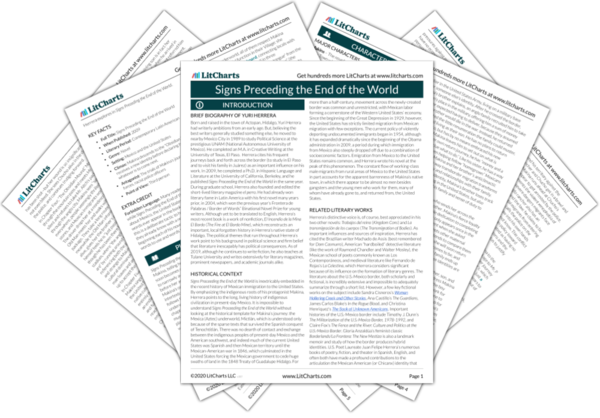Immigration, Myth, and Identity
Even if Herrera never labels it as such, Makina’s journey from her small Mexican town north and across the U.S. border is immediately recognizable as a migration narrative. But Herrera’s novel provides a fresh, critical perspective on the genre by exposing precisely how stories of migration have become an influential myth in rural Mexico, and basing his novel on a different myth: the Mexica underworld tale of Mictlán. In doing so, Herrera shows how…
read analysis of Immigration, Myth, and IdentityRacism, Inequality, and Social Change
When she crosses over into the United States, Makina immediately recognizes a profound contradiction in the status of Mexican immigrants: they are essential to the functioning of United States society, yet treated as unwanted intruders. People who leave Mexico for the United States are signing up to join the bottom echelons of society, to suffer racism and work in exploitative conditions that guarantee them few economic rights. By portraying the discrimination and arduous conditions that…
read analysis of Racism, Inequality, and Social ChangeFamily, Heritage, and Sense of Self
Herrera’s writing and Makina’s story are steeped in an intensely local vision of rural Mexico, one with deep ties to the land, language, and culture as they have existed since many centuries before the Spanish invaded the Americas. Makina’s sense of duty to her town and grounding in her local culture are closely related to her deep loyalty to her family—one that seems unflappable for almost the entire book, until it becomes suddenly impossible…
read analysis of Family, Heritage, and Sense of Self
The Power of Language
The power of Yuri Herrera’s prose and the power of his narrator, Makina, are both intimately linked to a facility with language: they share a profound instinct for when to use and withhold words, how to communicate old ideas through new language (and vice versa), and how to navigate the multilingual landscape of the U.S.-Mexico borderlands. Herrera’s deliberately pared-down prose and Makina’s capacity to form connections through translation highlight language’s emotional weight, showing how…
read analysis of The Power of LanguageGender Roles
Given the traditionally masculine narrative conventions of fiction about borders and migration, it is significant that Herrera puts a young woman at the center of his radical reinterpretation of the genre. Equally comfortable and competent in traditionally male and female gender roles, Makina refuses to heed the world’s call for separate, gendered spheres. By rejecting this distinction, Herrera shows that feminist writers need not choose between elevating concerns considered traditionally feminine or merely proving that…
read analysis of Gender Roles






